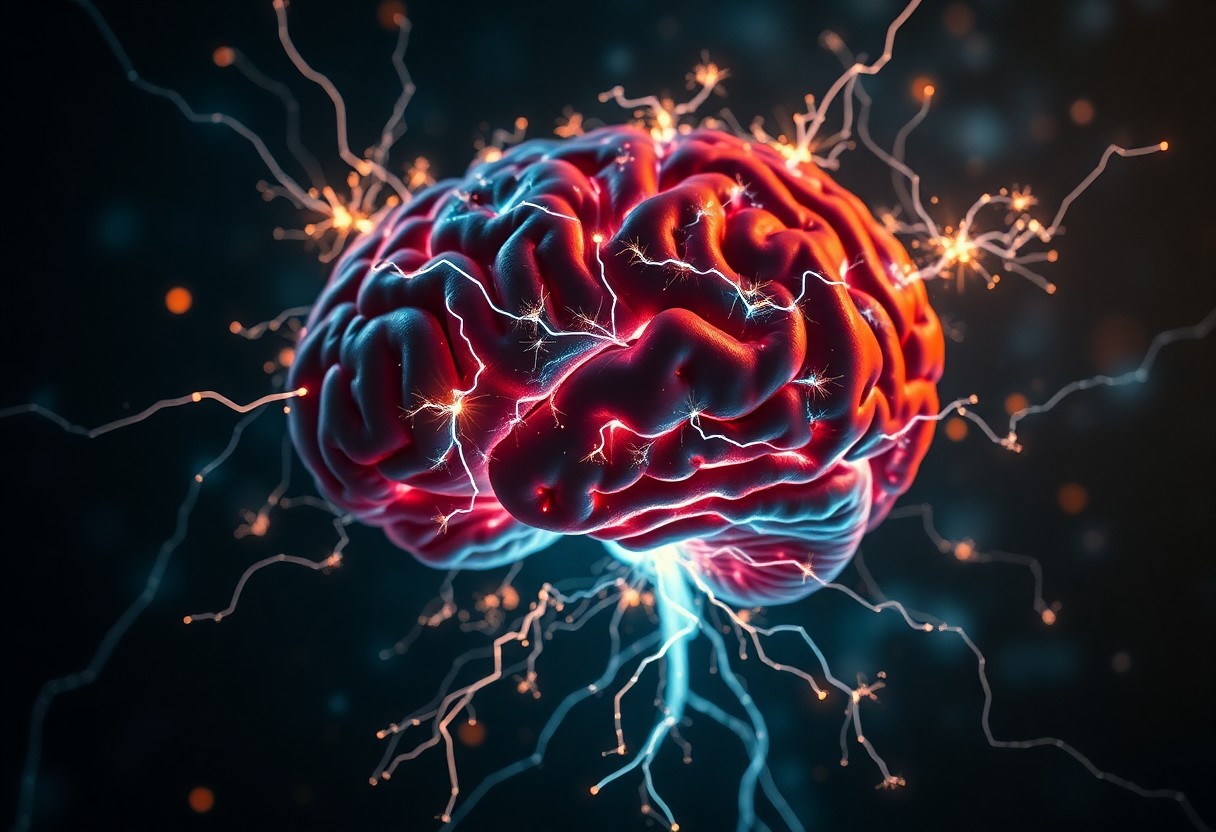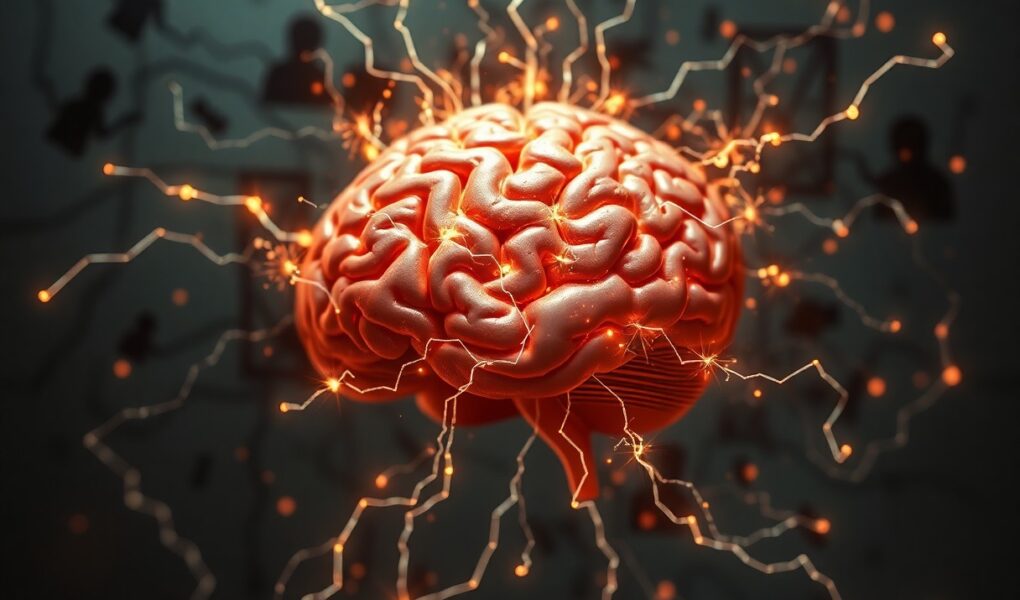Just when you think you understand your anxiety, you might experience something unexpected—brain zaps. These brief, often startling sensations can feel like electrical jolts or flickers in your head, leaving you feeling confused or unsettled. Understanding the connection between brain zaps and anxiety can help you navigate your experiences better. This post will explore what brain zaps are, why they may occur during periods of anxiety, and how you can manage this frustrating symptom effectively.
Understanding Brain Zaps
Your experience of brain zaps can be unsettling, especially if you’re unsure what they signal about your mental health. Often described as sudden, brief electrical shocks to the brain, these sensations can occur during periods of anxiety or when experiencing changes in medication. Understanding their nature is important for managing your overall well-being and finding effective coping strategies.
Definition and Symptoms
To put it simply, brain zaps are abrupt, jolting sensations that may feel like a jolt of electricity in your head. These sensations can be accompanied by other symptoms such as dizziness, disorientation, or even a momentary sensation of vertigo. Experiencing brain zaps can be a disconcerting reminder of the interconnectedness of your brain and your emotional state.
Causes and Triggers
Definition of brain zaps often encompasses a range of triggers that can vary from person to person. They are frequently reported during withdrawal from certain medications, particularly antidepressants and anti-anxiety medications, indicating the impact of chemical changes in your brain. Stress, abrupt changes in sleep patterns, or even excessive caffeine consumption can further exacerbate these sensations.
In addition to medication withdrawal, various lifestyle and psychological factors can contribute to the onset of brain zaps. High-stress levels, anxiety, and even fatigue can make your brain more sensitive, increasing the likelihood of experiencing these jolts. Understanding these potential triggers can help you identify patterns in your own experiences and seek more effective ways to manage anxiety and its symptoms.
The Connection Between Brain Zaps and Anxiety
Clearly, the relationship between brain zaps and anxiety is noteworthy. Brain zaps, often described as brief, electrical sensations in the brain, may occur more frequently in individuals grappling with anxiety. The heightened state of arousal and tension associated with anxiety disorders can trigger these unsettling sensations, leading to a cycle of distress that can exacerbate your overall anxiety. Understanding this connection can empower you to seek appropriate help and manage both your anxiety and the discomfort of brain zaps.
How Anxiety Influences Brain Zaps
One significant factor to consider is the body’s response to anxiety. When you experience heightened anxiety, your brain’s neurotransmitters may become imbalanced, possibly resulting in brain zaps. This alteration in brain chemistry can stir up feelings of unease and lead to those jolting sensations. Recognizing this link can help you gain insight into your experiences and promote healing strategies.
Brain Zaps as a Symptom of Anxiety Disorders
Among individuals dealing with anxiety disorders, brain zaps can emerge as a puzzling yet common symptom. These jolting sensations may manifest during moments of heightened anxiety or even between periods of stress. Awareness of how brain zaps relate to your anxiety can help you address your symptoms holistically and seek methods to alleviate both conditions.
Anxiety can often amplify the intensity and frequency of brain zaps you experience. Many individuals report that these sensations may accompany their anxiety episodes, contributing to a sense of disorientation or confusion. This interplay between anxiety disorders and brain zaps underscores the importance of addressing your anxiety holistically. Connecting with healthcare professionals, exploring therapy options, and adopting relaxation techniques can be valuable steps in mitigating both your anxiety symptoms and the unsettling brain zaps you face.
Managing Brain Zaps
If you’re experiencing brain zaps, understanding how to manage them effectively can greatly enhance your quality of life. Start by tracking your symptoms and identifying potential triggers, such as changes in medication or stress levels. Implementing relaxation techniques and creating a supportive environment can also help alleviate the intensity of these sensations.
Lifestyle and Coping Strategies
Along with medical support, integrating lifestyle changes can significantly improve your overall well-being. Focus on maintaining a balanced diet, engaging in regular exercise, and ensuring adequate sleep. Practicing mindfulness and deep breathing exercises can also help reduce anxiety levels and minimize the occurrence of brain zaps.
When to Seek Professional Help
At times, you might find that brain zaps become more frequent or disruptive to your daily life. This could indicate an underlying issue that requires professional guidance. Don’t hesitate to reach out to your healthcare provider if you experience persistent brain zaps, increased anxiety, or any other concerning symptoms.
Consequently, scheduling an appointment with your healthcare professional may provide clarity and reassurance. They can assess your specific situation, determine the cause of your brain zaps, and suggest appropriate treatment options. Whether it involves adjusting your medication or exploring new coping strategies, a tailored approach can empower you to manage your symptoms more effectively.
Treatment Options
To effectively address brain zaps and anxiety, a combination of treatment options is available, allowing you to tailor your approach to your specific needs. These may include medications, therapies, and alternative methods, all aimed at alleviating symptoms and improving your overall mental health.
Medications and Therapies
With various medications, such as SSRIs and benzodiazepines, along with cognitive behavioral therapy (CBT), you can manage anxiety and potentially reduce the frequency of brain zaps. Working closely with a healthcare provider is imperative for finding the right combination that suits your unique situation.
Alternative Approaches
To enhance your treatment plan, you might explore alternative approaches like mindfulness, yoga, acupuncture, and herbal supplements. These methods can help you find balance and reduce anxiety effectively.
Consequently, integrating alternative approaches into your routine can provide additional support in managing your anxiety and brain zaps. Practices such as mindfulness meditation can improve your emotional well-being, while regular physical activity boosts overall mental health. Additionally, exploring natural supplements, under healthcare guidance, may offer further relief. By considering these options, you create a holistic strategy that supports both your mental and physical health.
Research and Evidence
Once again, it’s important to explore the scientific understanding of brain zaps and their connection to anxiety. Recent research has begun to highlight the relationship between these phenomena, offering insights into how your neurological health can be impacted by emotional well-being. By examining various studies, you can gain a deeper understanding of how your brain processes stress and anxiety, and how this might lead to the unmistakable sensation of brain zaps.
Studies on Brain Zaps
Evidence from clinical studies suggests that brain zaps are quite common among individuals withdrawing from certain medications, particularly antidepressants. These zaps, often described as an electrical shock or jolt in the brain, may also be interconnected with anxiety symptoms. Understanding how these sensations arise can be instrumental for you in managing your experiences and finding effective coping strategies.
The Relationship between Anxiety and Neurological Health
Behind the scenes, your anxiety may be signaling changes in your neurological health, which can manifest as brain zaps. Studies have suggested that the stress associated with anxiety can alter neurotransmitter function, potentially leading to irregular brain activity. This relationship implies that addressing your anxiety not only aids in mental well-being but may also contribute positively to your neurological functioning.
Understanding the connection between anxiety and neurological health can empower you to take proactive steps in managing your mental state. When anxiety levels rise, neurotransmitter imbalances may occur, affecting how your brain functions. By exploring effective coping methods and possibly engaging with professional help, you can foster a healthier mind and potentially reduce the occurrences of brain zaps. This journey of self-care can significantly enhance your overall well-being and quality of life.

Personal Accounts
All across the internet, individuals have shared their personal journeys with brain zaps and anxiety. These experiences often highlight the profound effects these sensations can have on daily life, emphasizing feelings of confusion, fear, and isolation. By listening to these stories, you can gain understanding and find comfort in knowing that you are not alone in your struggles. Personal narratives illuminate the emotional and psychological facets of this challenging experience, providing a sense of community and shared resilience.
Testimonials from Individuals Experiences
Any person who has experienced brain zaps often describes them as disconcerting, bringing about intense waves of anxiety. Many individuals note that these sensations can trigger panic attacks or exacerbate existing mental health conditions, further complicating your emotional landscape. Hearing these testimonials can help you validate your own experiences and explore possible coping strategies.
Expert Insights and Perspectives
An understanding of brain zaps from mental health professionals means insights that can shed light on the connection between these sensations and anxiety. Experts often point out that brain zaps might be linked to the withdrawal or adjustment of certain medications, affecting your neural pathways. Recognizing this connection can empower you to seek help and open a dialogue with healthcare providers.
Plus, experts emphasize that brain zaps can evoke substantial emotional responses, contributing to heightened anxiety levels. They underline the importance of addressing both the physical sensations and the underlying anxiety simultaneously. By consulting professionals, you can receive tailored advice and therapeutic options to manage the symptoms effectively. Understanding the science behind brain zaps can enhance your coping strategies and provide you with the tools to navigate this challenging experience.
To wrap up
Considering all points, understanding the connection between brain zaps and anxiety can be pivotal for your mental well-being. These jolting sensations are often linked to changes in your medication or anxiety disorders, creating discomfort that may amplify your stress. By recognizing this relationship, you empower yourself to seek appropriate help, whether that’s consulting with a healthcare professional or implementing coping strategies. Staying informed about your symptoms can enhance your capacity to manage anxiety and improve your overall quality of life.










